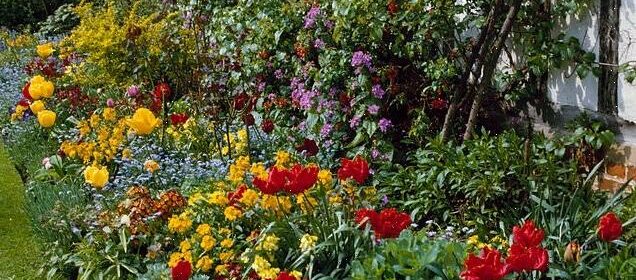Planting now can give next year's borders a cheery boost

COLOUR UP FOR SPRING: Planting now can give next year’s borders a cheery boost
- Nigel Colborn advises now is the time to start planting for a cheerful spring
- UK gardening expert says spring bedding plants ae ready for planting now
- He however adds that any tender plants won’t be safe outdoors before May
Start planting now if you want a cheerful spring. Even though prices are soaring and budgets are tight, a few spring plants could create a low-cost but wonderfully uplifting early show.
Tender plants won’t be safe outdoors before May. Any left outside now will be over in a few more weeks. So we can fill any spaces they leave with bulbs and broad-leaved spring plants.
There’s a vast choice of bulbs. Spring bedding plants are more limited but there are still enough. Those are ready for planting now, many for blending with bulbs. Both plant types look lovely together, in formal bedding or a mixed border.
Spring bedding plants are more limited but there are still enough. Those are ready for planting now, many for blending with bulbs
Bulbs are the stars. But companion bedding enriches the show, extending the season. Spring biennials, especially wallflowers and forget-me-nots, can be superb from March to May.
Forget-me-nots provide a changing show, ending with a mist of blue, pink or white. Fragrant wallflowers can show colour from late February, running well into May.
By then, you can replace all with summer plants.
Smaller-scale beauties include pansies and violas. The best of those flower sporadically through winter, ending with a spring flourish. Small-flowered violas such as the Sorbet series are the prettiest and most durable.
THE PRIMROSE PATH
Nothing beats the simple beauty of wild primroses, cowslips and woodland oxlips. All flourish in wild areas of my garden. But for spring borders you might want brighter, more jolly colours.
For containers or beds, primroses give a fabulous spring show. Modern varieties may be too garish for some tastes, but Brookside nursery (brooksidenursery.co.uk) offers pastel-toned Candy Mixed and a super yellow double, Belarina Buttercup. Among polyanthus, Crescendo offers a sturdy colourful mix.
For a fabulous spring show, plant midseason tulips among your primulas. Those will extend their stems above the ground cover, giving a spectacular finale. Primulas can be split to provide young plants for next year. For cottage garden styles, there are older, more charming primrose varieties. For centuries the compact, purple-red primrose Wanda has been a popular choice.
For containers or small beds, there are more special primulas. I love the eastern form of our wild primrose, P. vulgaris var. sibthorpii. Instead of being pale yellow, the flowers are soft lilac-mauve. In all other respects, they’re just like our familiar woodland primroses.
LIFT AND DIVIDE
With milder winters, the growing season seems to run from February to December. Though frightening for climate change, that keeps our gardens interesting almost all year.
As well as precocious snowdrops and January crocuses, we can enjoy broadleaved plants, too. Among those, pulmonarias or lungworts are huge contributors. Their large, silvery-stippled leaves are decorative all winter. Some begin flowering in January. Earliest of those, Pulmonaria rubra has pink flowers.
Hard times make us cautious about spending. But all plants mentioned, apart from the bulbs, are easily propagated, long-term perennials. All you need do is to split the plants every few years.
Source: Read Full Article
